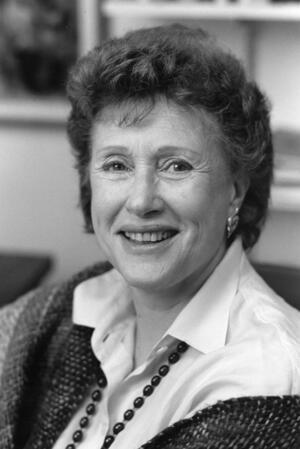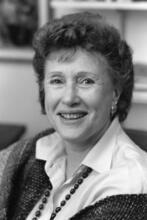Amy Swerdlow
In her youth, Amy Swerdlow’s activism focused on causes associated with the Communist Party, to which her parents belonged. Eventually disillusioned with communism, she withdrew from politics for an extended period but recommitted herself in the 1960s, when she became a founder, leader, and global spokeswoman for the anti-militarist organization Women Strike for Peace. Work for WSP awakened in Swerdlow a desire to know the history of women’s activism, and she earned both an M.A. and a Ph.D. in pursuit of that knowledge. As an administrator and later a professor at Sarah Lawrence College, she directed its graduate program in women’s history, helped to launch Women’s History Month, became an early contributor to feminist thought about intersectionality, and produced a pathbreaking book on Women Strike for Peace.
In 1990, the New York Times observed, “Amy Swerdlow does not settle for small goals” (Klein ). By then, Swerdlow was known nationally and internationally as a leader of the women’s peace movement and as a pioneer in the field of women’s history. Long before her name was widely recognized, however, she had dreamed of changing the world in big ways.
Family and Education
Amy Miriam Swerdlow, born Amner Galstuck, was the only child of Joseph and Esther (Rodner) Galstuck, both naturalized immigrants from Poland and members of the Communist Party. Born on January 20, 1923, in New York City, she grew up in the East Bronx in the United Workers Cooperatives, a collectively owned apartment complex established by Jewish leftists employed in the needle trades. (Joseph Galstuck was a milliner and a leader of the United Cloth Cap and Hat Makers union.) Marching in May Day parades, attending the left-wing Camp Kinderland, and mobilizing in support of the Loyalist cause in Spain, Swerdlow shared her parents’ dream of a new social order that would usher in global peace and justice for workers of all nations.
A product of New York City’s public schools, Swerdlow graduated from Evander Childs High School at age sixteen and went on to earn a B.A. at Hunter College, then a women’s school that specialized in teacher training. At Hunter, she joined the American Student Union and established lasting friendships with several ASU members who would later work with her in the women’s peace movement: Judy (Keller) Lerner, Miriam (Kolkin) Kelber, and Bella (Savitzky) Abzug. Let down when the ASU disbanded in 1941 and further disheartened by both the Cold War and the revelations of Stalinism’s brutality, Swerdlow withdrew from political activism for almost two decades.
In 1949, she married Stanley Swerdlow, a textile designer and executive who in the 1960s became a successful producer of Off-Broadway theater, including the antiwar musical Viet Rock. Settling in Great Neck, New York, the couple had four children: Joan (1952), Ezra (1953), Lisa (1954), and Thomas (1962). The same year her youngest child was born, Swerdlow earned a master’s degree in art history at New York University.
Expanding Activism
Swerdlow’s return to activism took place in 1961, when a neighbor in Great Neck recruited her to participate in a women’s demonstration against the nuclear arms race. This protest—one of many local actions that together mobilized some 50,000 women in 60 cities across the United States—marked the debut of Women Strike for Peace (WSP), which remained active into the 1990s. In addition to campaigning against the arms race, it organized against the United States’ war in Southeast Asia, protested U.S. intervention in Latin America and the Middle East, and oversaw peace projects that brought together Jewish and Palestinian women in Israel. Swerdlow, who signed on as a charter member of WSP’s New York chapter, edited the organization’s national periodical, Women Strike for Peace Memo (1964-1973), and traveled extensively to speak on WSP’s behalf, not only in the United States but also in Asia, Europe, and Latin America. Over the course of the 1960s, she also became a member of the national board of the antiwar group Clergy and Laity Concerned; chair of the steering committees of two antiwar coalitions of women’s groups, the Jeannette Rankin Brigade and the Women’s Emergency Coalition; a member of the New York State coordinating council of the National Women’s Political Caucus; and a leader of a campaign to desegregate housing in Great Neck.
Becoming a Women’s Historian
Looking back in an autobiographical essay, Swerdlow credited her work with WSP for awakening her interest in women’s history: “I wanted to learn my own roots as a radical woman, to find my own and my mother’s foremothers, to understand the intersection of gender and class.” (Swerdlow, “A Child of the Old, Old Left,” 255). In 1972 she entered Sarah Lawrence College’s brand-new graduate program in women’s history, the first of its kind in the United States. Her primary mentor there was the program’s director Gerda Lerner, who recognized Swerdlow’s talents as an organizer as well as her gifts as a historian. A year before she completed work toward her degree, Lerner recruited Swerdlow to teach a special seminar titled “Women Organizing Women,” which brought together undergraduates, graduate students, and women activists from the surrounding community.
Swerdlow earned her M.A. in women’s history from Sarah Lawrence in 1974. The same year, she began a five-year stint as the graduate program’s associate director. In that role, she oversaw the program’s day-to-day administration as well as special projects, including the American Historical Association’s first summer institute for high-school teachers interested in incorporating women’s history into their courses and a national conference of women activists that generated the campaign to establish March as Women’s History Month. Along the way, she began doctoral studies at Rutgers.
In 1981, two years after her resignation as the graduate program’s associate director, Swerdlow returned to Sarah Lawrence as the program’s director and a professor of American history and women’s studies. For three years, she juggled these responsibilities with ongoing work on her doctoral dissertation, a history of Women Strike for Peace; she earned her Ph.D. in 1984. As soon as that project was complete, she began work on the book Women Strike for Peace: Traditional Motherhood and Radical Politics in the 1960s, published in 1993. As she worked on the dissertation and then the book, Swerdlow also helped to organize academic conferences on differences among women, co-edited (with Johanna Lessinger) the anthology Class, Race and Sex: The Dynamics of Control (1983; an early contribution to feminist thinking about intersectionality), and served as guest editor of a special issue of Women’s Studies Quarterly (Summer 1984) that explored methods of teaching about war and peace and proposed the establishment of feminist peace studies as a field of its own. First and foremost, however, she devoted herself to the women’s history program, where she was an innovative teacher, a generous mentor of graduate students, and an inspiring colleague.
Later Career
In 1993—the year before Congress outlawed mandatory retirement of professors—Swerdlow retired from Sarah Lawrence, the last of its faculty members compelled to step down at age 70. The job ended at a challenging moment, less than two years after her husband Stanley’s death following a long struggle with Parkinson’s disease. Forced retirement by no means ended Swerdlow’s career, however. Her publications after 1993 included numerous book reviews for historical journals, an essay derived from her M.A. thesis on women abolitionists in New York City, an essay on the Communist-led women’s rights organization the Congress of American Women, a memoir for the anthology Red Diapers: Growing Up in the Communist Left, and an article on the sculptor and peace activist Ella Tulin. She was also a key contributor to the film At Home in Utopia, a documentary about the United Workers Cooperatives that relied heavily on Swerdlow’s reminiscences on camera. At the end of her life, she was working toward a book-length political memoir about her relationship with her father, a dogmatic Marxist who broke with the Communist Party in the 1950s and, in contrast to his un-doctrinaire daughter, became a vehement anti-communist.
Among women’s historians, Swerdlow is best remembered for her scholarship on Women Strike for Peace. Like many women activists over the past two and a half centuries, WSP members defined themselves as mothers, proclaiming that their obligations as such justified, even required, political engagement. This “maternalist” tradition drew criticism from some feminist activists and theorists, who saw it as politically backward or at least a slippery slope toward conservatism. While these issues are still debated, Swerdlow established beyond a doubt that WSP’s maternalism fundamentally challenged the Cold War consensus that men should run the world while mothers stayed home. Her most memorable argument to that effect was a detailed analysis of WSP’s use of tongue-in-cheek maternal rhetoric to demolish an attack on the organization by the House Un-American Activities Committee.
Amy Swerdlow died on March 30, 2012. Among her many legacies are the Women Strike for Peace Records, housed at Swarthmore College and fully open to researchers. She preserved and donated the bulk of this large collection.
Ancestry.com.
Goldman, Michal, writer, producer, editor. At Home in Utopia, 2008. DVD. New Day Films, 2008.
Klein, Easy. “A Women’s Agenda on World Issues: ‘Helping Our New Women Leaders Believe in Themselves.’” New York Times, April 22, 1990, WC 18.
Lerner, Gerda. Living with History/Making Social Change. Chapel Hill: University of North Carolina Press, 2009.
Levine, Susan Braun, and Mary Thom, eds. Bella Abzug: How One Tough Broad from the Bronx Fought Jim Crow and Joe McCarthy, Pissed Off Jimmy Carter, Battled for the Rights of Women and Workers, Rallied Against War and for the Planet, and Shook Up Politics Along the Way. New York: Farrar, Straus and Giroux, 2007.
Sarah Lawrence College Archives, Yonkers, NY.
National Women’s History Week Papers.
Women’s History Graduate Program Records.
Swarthmore College Peace Collection, Swarthmore, PA.
Women Strike for Peace Records, 1961-1996.
Swerdlow, Amy. “A Child of the Old, Old Left.” In Red Diapers: Growing Up in the Communist Left, edited by Judy Kaplan and Linn Shapiro, 249-256. Urbana: University of Illinois Press, 1998.
Swerdlow, Amy. “The Congress of American Women: Left-Feminist Peace Politics in the Cold War.” In U.S. History As Women's History: New Feminist Essays, edited by Linda Kerber, Alice Kessler-Harris, and Kathryn Kish Sklar, 296-312. Chapel Hill: University of North Carolina Press, 1995.
Swerdlow, Amy. “Ladies’ Day at the Capitol: Women Strike for Peace versus HUAC.” Feminist Studies 8, no. 3 (Autumn 1982): 493-520.
Swerdlow, Amy. Women Strike for Peace: Traditional Motherhood and Radical Politics in the 1960s. Chicago: University of Chicago Press, 1993.
Swerdlow, Amy and Johanna Lessinger, eds. Class, Race, and Sex: The Dynamics of Control. Boston: G.K. Hall, 1983.




